Picking a fight with yourself
- Published
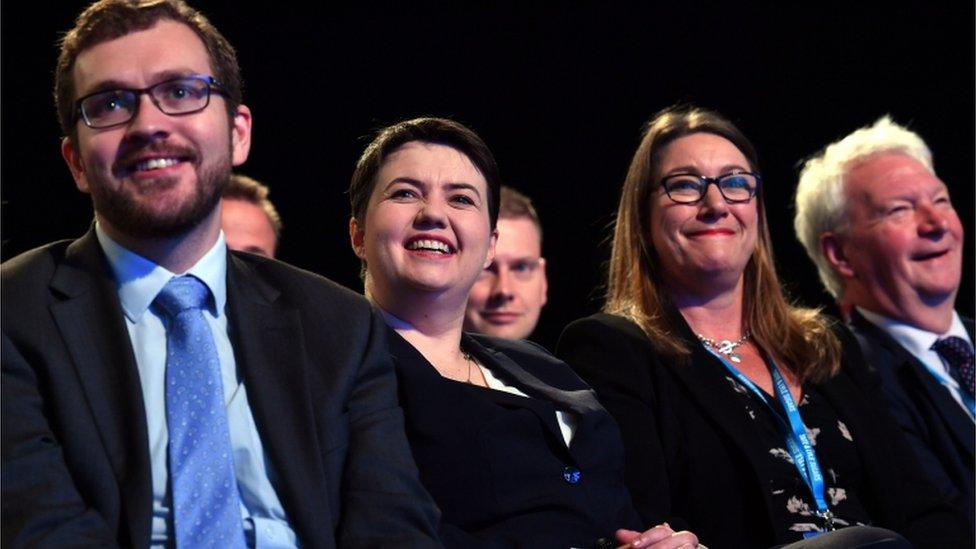
It's been all smiles on the surface at the Conservative conference - but internal disquiet is the order of the day
Almost by definition, almost from first principles, politics is about contention, about argument. The trick for a political party is to pick a fight with their opponents - rather than with themselves or, even worse, the voters.
The Conservatives are currently struggling with that dilemma. The mood in Manchester is cautious, constrained.
The applause is mostly muted, the standing ovations less than overtly energetic, the atmosphere not gloomy exactly, but a degree or two lower than ecstatic. As one chum advised me: "How would it be if they'd lost?"
The cause is not hard to find. It is internal disquiet. Will Boris Johnson resign? Will he be sacked? Just what on earth will he say or write next? It all contributes to anxiety.
On the fringe, Ruth Davidson was asked, repeatedly, to say what the PM should do about the foreign secretary. She, repeatedly, sidestepped the question.
However, she did say that if any of her MSPs were in the audience and were contemplating writing articles for the Scottish press which contradicted party policy, they should think again. They would be "out on their ear" because nobody was unsackable. She then grinned.
Chancellor Philip Hammond, has evinced similar sentiments. In his speech today, he said that he would not understate the challenges involved in Brexit. They would be huge - although, equally, there were substantial prizes on offer. Again, this was aimed at Mr Johnson.
OK, it's all coded, at least in public. But the audience in Manchester knows precisely what is going on. Hence the anxiety.
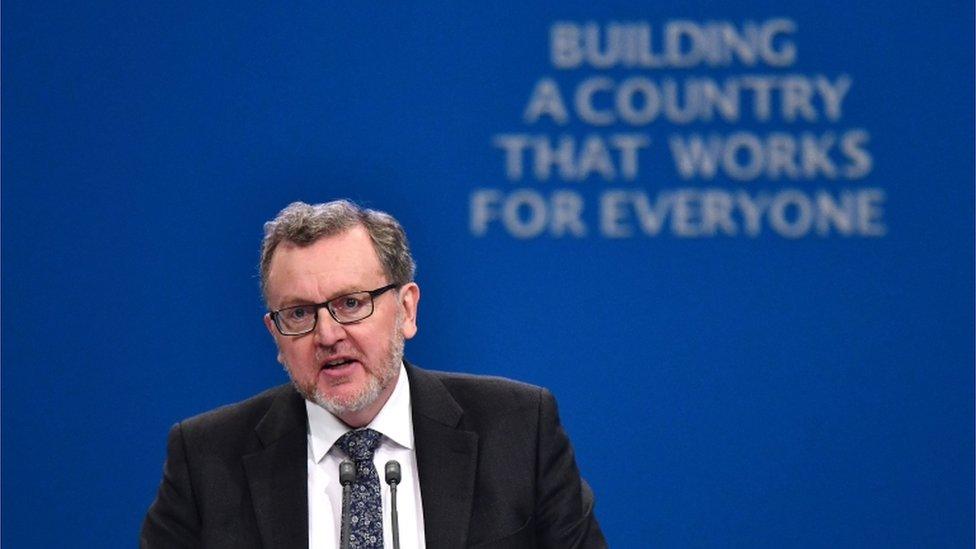
David Mundell called on the SNP to abandon any future talk of a second independence referendum
But, alongside all this, there has been a word or two about contemporary politics and particularly the Tories' opponents. The Chancellor said that the party and UK ministers must be more vigorous in contesting what he called the Marxist approach of Jeremy Corbyn.
And the Scottish Secretary, David Mundell, turned his attention to the SNP, highlighting Tory gains at the recent UK general election and suggesting to Nicola Sturgeon that she might assist Scotland by abandoning all talk of a second independence referendum.
Do you think she will oblige at the SNP conference next week? Thought you might say that.
Mr Mundell, of course, knows that perfectly well. His objective was to depict the Tories as the prime, nay sole, combatants contesting the SNP agenda.
Common frameworks
The Scottish secretary also addressed the topic of Brexit, arguing once more that the process would leave the Scottish Parliament with more powers.
Yes, but which ones and when, say Scottish ministers. They argue that those EU powers which are in devolved areas, such as farming, should simply return en bloc to Holyrood. No ifs, no buts.
Mr Mundell said there would need to be "common frameworks" across the UK, recreating the EU joint structure. This, he said, was common sense. Fine, say Scottish ministers, but devolve the powers first - then talk about sharing power. By agreement.
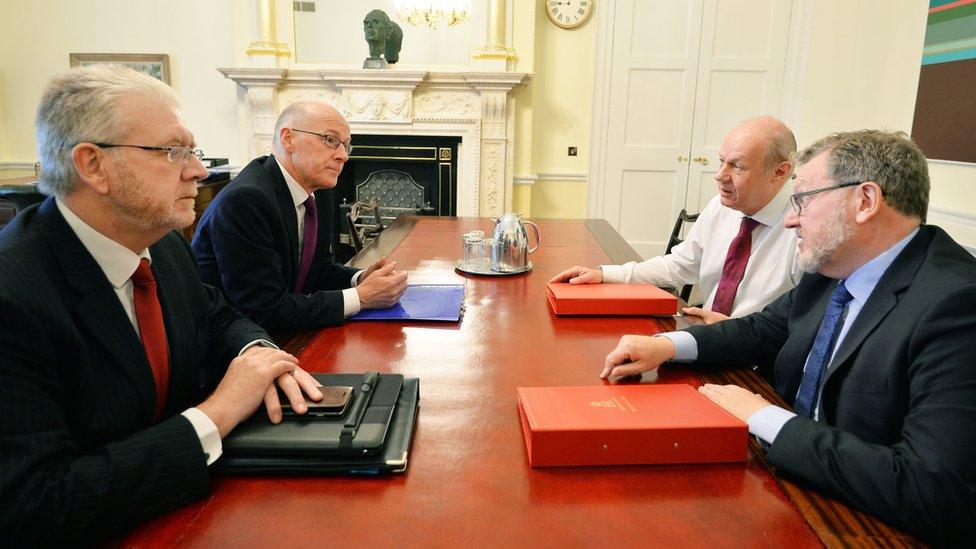
Scottish and UK ministers have met repeatedly to discuss post-Brexit powers, and are yet to reach a deal
A couple of things occur. Firstly, this argument over repatriated powers is substantive and significant. It really matters how farming subsidies or justice issues are run. As it does, to varying degrees, with each of the 111 powers identified by the UK Cabinet Office and spotlighted by Mike Russell, Scotland's Brexit minister.
But, en passant, one might note that it still represents a substantial shrinkage from the previous objectives of Scottish ministers.
These were, in rough order, to prevent Brexit, then to secure a place for Scotland at the EU negotiating table, to keep the UK and/or Scotland in the single market.
To emphasise, these aims have not been abandoned. Far from it. But they have slipped down the pragmatic ranking as they have each in turn been side-lined or explicitly rejected by the UK government.
To be clear further, I am not remotely blaming Scottish ministers for this. They have pursued aims which they believed firmly were in line with Scottish interests. However, the reality of sovereign power in the UK - and the absence of a veto over Brexit, made plain by the Supreme Court - has strictly limited their scope for manoeuvre.
Which explains the current focus upon the 111 powers. Talks between the two governments are continuing. But there remains a disparity of expectations.
Deal or no deal
In the UK camp, there is relative optimism about a deal. It is said this might be founded on three factors.
The first would be finding a formula predicated upon a calculation of proportionality or salience by which one would determine which powers should be wholly devolved and which should be shared with the UK.
The second would be the prospect that any devolution of further powers - say, in agriculture or other areas - would be accompanied by the transfer to the Scottish government of additional cash, if required by the new responsibility.
The third would be a guarantee that the Scottish government would have a role in determining future policy making in those areas which are shared across the UK, post repatriation from Brussels.
That latter offer, incidentally, is said to be the subject of contention within the UK government itself.
To emphasise, this is very far from a formal offer. It is more by way of speculation as to what any offer, any deal, might comprise.
To emphasise, secondly, this scenario is not recognised or endorsed by Scottish Mministers. Mr Russell has set out his own perspective, involving amendments to the EU Withdrawal Bill to ensure that EU powers in devolved areas are returned to Scotland, that the "power grab" as he styles it does not happen in the first place.
- Published2 October 2017
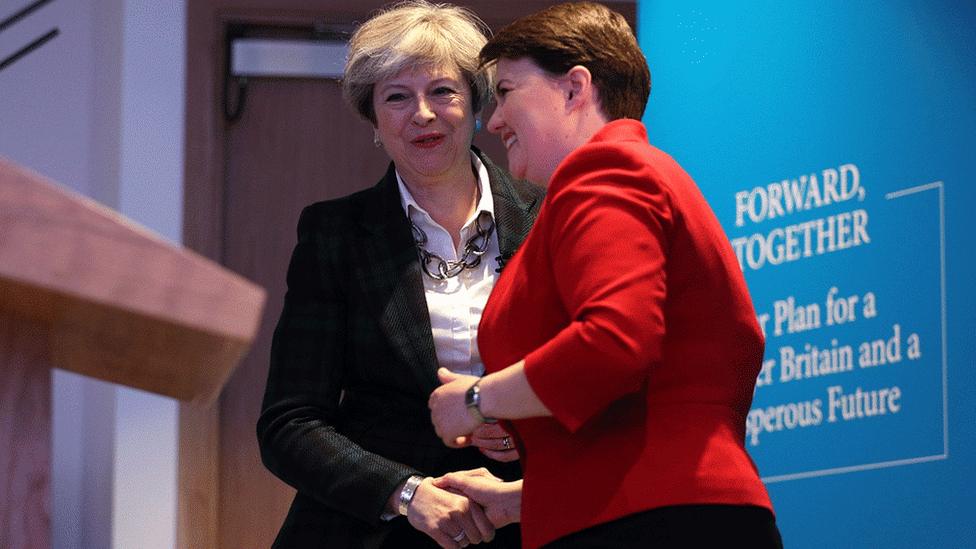
- Published2 October 2017
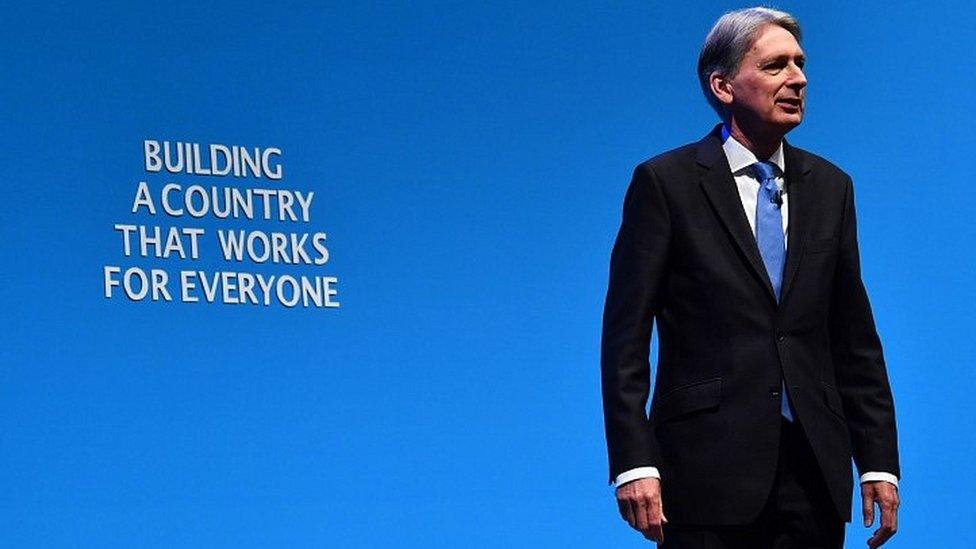
- Published25 September 2017
